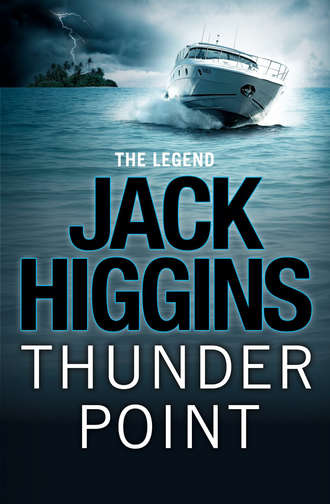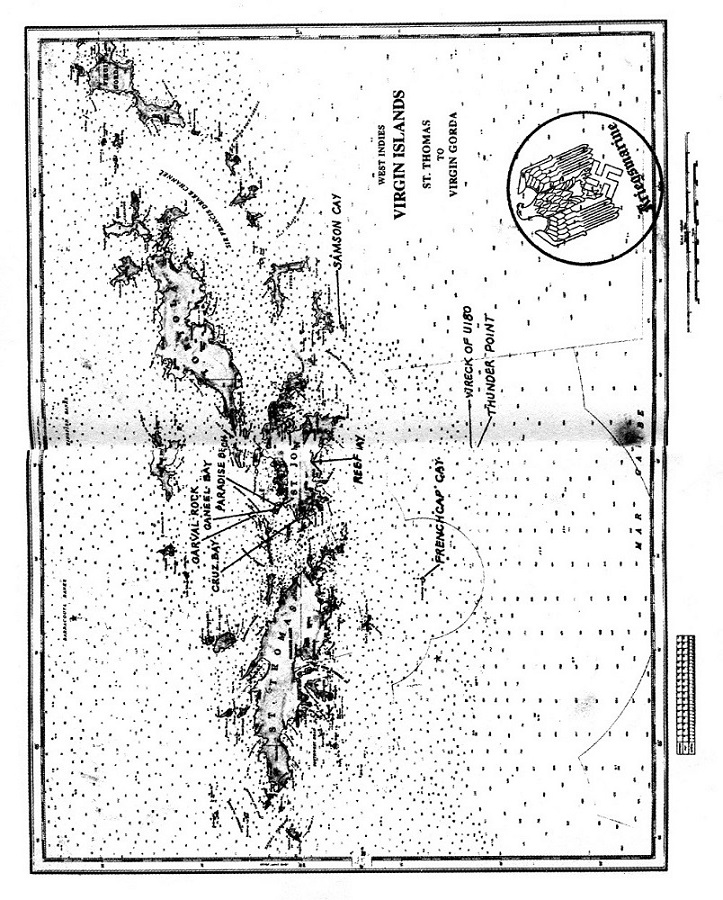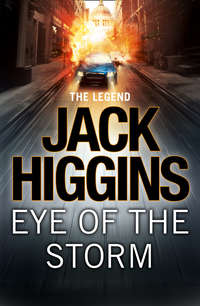
Полная версия
Thunder Point


Thunder Point

Copyright
Harper
An imprint of
HarperCollinsPublishers
1 London Bridge Street,
London SE1 9GF
www.harpercollins.co.uk
First published in Great Britain by Michael Joseph Ltd 1993
Copyright © Jack Higgins 1993
Jack Higgins asserts the moral right to be identified as the author of this work
A catalogue record for this book is available from the British Library
This novel is entirely a work of fiction. The names, characters and incidents portrayed in it are the work of the author’s imagination. Any resemblance to actual persons, living or dead, events or localities is entirely coincidental.
This is a work of fiction. Names, characters, places, and incidents either are the products of the author’s imagination or are used fictitiously. Any resemblance to actual events, locales, organizations, or persons, living or dead, is entirely coincidental and beyond the intent of either the author or the publisher.
All rights reserved under International Copyright Conventions. By payment of the required fees, you have been granted the non-exclusive, non-transferable right to access and read the text of this e-book on-screen. No part of this text may be reproduced, transmitted, down-loaded, decompiled, reverse engineered, or stored in or introduced into any information storage and retrieval system, in any form or by any means, whether electronic or mechanical, now known or hereinafter invented, without the express written permission of HarperCollins e-books.
Source ISBN: 9780007456058
Ebook Edition © June 2012 ISBN: 9780007456055
Version: 2015-01-13
Dedication
For my daughter Hannah

Epigraph
Whether Reichsleiter Martin Bormann, Head of the Nazi Party Chancellery and Secretary to Adolf Hitler, the most powerful man in Germany after the Führer, actually escaped from the Führer Bunker in Berlin in the early hours of 2 May 1945 or died trying to cross the Weidendammer Bridge has always been a matter of conjecture. Josef Stalin believed him to be alive, Jacob Glas, Bormann’s chauffeur, swore that he saw him in Munich after the war and Eichmann told the Israelis he was still alive in 1960. Simon Wiesenthal, the greatest Nazi hunter of them all, always insisted he was alive and then there was a Spaniard who had served in the German SS who insisted that Bormann had left Norway in a U-boat bound for South America at the very end of the war…
Table of Contents
Cover
Title Page
Copyright
Dedication
Thunder Point Map
Epigraph
Prologue
1992
Chapter 1
Chapter 2
Chapter 3
Chapter 4
Chapter 5
Chapter 6
Chapter 7
Chapter 8
Chapter 9
Chapter 10
Chapter 11
Chapter 12
Chapter 13
Chapter 14
Chapter 15
Chapter 16
Keep Reading
About the Author
Also by Jack Higgins
About the Publisher
30 April 1945
The city seemed to be on fire, a kind of hell on earth, the ground shaking as shells exploded and, as dawn came, smoke drifted in a black pall. In the eastern half of Berlin, the Russians were already formally in control, and refugees, carrying what they could of their belongings, moved along Wilhelmstrasse close to the Reich Chancellery in the desperate hope of somehow reaching the West and the Americans.
Berlin was doomed, everyone knew that, and the panic was dreadful to see. Close by the Chancellery, a group of SS were stopping everyone they saw in uniform. Unless such individuals could account for themselves they were immediately accused of desertion in the face of the enemy and hung from the nearest lamppost or tree. A shell screamed in, fired at random by Russian artillery. There were cries of alarm and people scattered.
The Chancellery itself was battered and defaced by the bombardment, particularly at the rear, but deep in the earth, protected by thirty metres of concrete, the Führer and his staff still worked on in a subterranean world that was totally self-supporting, still in touch by radio and radio-telephone with the outside world.
The rear of the Reich Chancellery was also damaged, pock-marked by shell fire, and the once-lovely gardens were a wilderness of uprooted trees and the occasional shell hole. One blessing; there was little air activity, low cloud and driving rain having cleared the sky of aircraft for the moment.
The man who walked in that ruined garden on his own seemed curiously indifferent to what was happening, didn’t even flinch when another shell landed on the far side of the Chancellery. As the rain increased in force, he simply turned up his collar, lit a cigarette and held it in cupped hand as he continued to walk.
He was not very tall with heavy shoulders and a coarse face. In a crowd of labourers or dock workers he would have faded into the background, nothing special, not memorable to the slightest degree. Everything about him was nondescript from the shabby ankle-length greatcoat to the battered peaked cap.
A nobody of any importance, that would have been the conclusion and yet this man was Reichsleiter Martin Bormann, Head of the Nazi Party Chancellery and Secretary to the Führer, the most powerful man in Germany next to Hitler himself. The vast majority of the German people had never even heard of him and even fewer would have recognized him if they saw him. But then he had organized his life that way, deliberately choosing to be an anonymous figure wielding his power only from the shadows.
But that was all over, everything was finished and this was the final end of things. The Russians could be here at any moment. He’d tried to persuade Hitler to leave for Bavaria, but the Führer had refused, had insisted, as he had publicly declared for days, that he would commit suicide.
An SS corporal came out of the Bunker entrance and hurried towards him. He gave the Nazi salute. ‘Herr Reichsleiter, the Führer is asking for you.’
‘Where is he?’
‘In his study.’
‘Good, I’ll come at once.’ As they walked towards the entrance several shells landed on the far side of the Chancellery again, debris lifting into the air. Bormann said, ‘Tanks?’
‘I’m afraid so, Herr Reichsleiter, less than half a mile away now.’
The SS corporal was young and tough, a seasoned veteran. Bormann clapped him on the shoulder. ‘You know what they say? Everything comes to he who waits.’
He started to laugh and the young corporal laughed with him as they started down the concrete steps.
When Bormann knocked on the study door and went in the Führer was seated behind the desk, examining some maps with a magnifying glass. He glanced up.
‘Ah, Bormann, there you are. Come in. We don’t have much time.’
‘I suppose not, my Führer,’ Bormann said uncertainly, unsure of what was meant.
‘They’ll be here soon, Bormann, the damned Russians, but they won’t find me waiting. Stalin would like nothing better than to exhibit me in a cage.’
‘That can never be, my Führer.’
‘Of course not. I shall commit suicide and my wife will accompany me on that dark journey.’
He was referring to his mistress Eva Braun, who he had finally married at midnight on the 28th.
‘I had hoped that even now you would reconsider whether or not to make a break for Bavaria,’ Bormann told him, but more for something to say than anything else.
‘No, my mind is made up, but you, my old friend, you have work to do.’
Hitler stood up and shuffled round the table, the man who only three years previously had controlled Europe from the Urals in the east to the English Channel. Now, his cheeks were sunken, his jacket appeared too large, and when he took Bormann’s hands, his own shook with palsy. And yet the power was there still and Bormann was moved.
‘Anything, my Führer.’
‘I knew I could depend on you. The Kameradenwerk, Action for Comrades.’ Hitler shuffled back to his chair. ‘That is your task, Bormann, to see that the National Socialism survives. We have hundreds of millions in Switzerland and elsewhere in the world in gold in numbered accounts, but you have details of those.’
‘Yes, my Führer.’
Hitler reached under his desk and produced a rather strange-looking briefcase, dull silver in appearance. Bormann noted the Kriegsmarine insignia etched in the top right-hand corner.
Hitler flicked it open. ‘The keys are inside along with a number of items which will prove useful to you over the years.’ He held up a buff envelope. ‘Details of similar accounts in various South American countries and the United States. We have friends in all those places only waiting to hear from you.’
‘Anything else, my Führer?’
Hitler held up a large file. ‘I call this the Blue Book. It contains the names of many members of the British Establishment, both in the ranks of the aristocracy and Parliament, who are friendly to our cause. A number of our American friends are there also. And last, but not least.’ He passed another envelope across. ‘Open it.’
The paper was of such quality that it was almost like parchment. It had been written in English in July 1940, in Estoril in Portugal and was addressed to the Führer. The signature at the bottom was that of His Royal Highness the Duke of Windsor. It was in English and the content was quite simple. He was agreeing to take over the throne of Great Britain in the event of a successful invasion.
‘The Windsor Protocol,’ Hitler said simply.
‘Can this be true?’ Bormann asked in astonishment.
‘Himmler himself vouched for it. He had the Duke approached by his agents in Portugal at the time.’
Or said that he had, Bormann told himself. That devious little animal had always been capable of anything. He replaced the document in its envelope and handed it to the Führer who replaced it and the other items in the briefcase. ‘This is standard issue to the U-boat captains at the moment. Completely self-sealing, water and fire-proof.’ He pushed it across to Bormann. ‘Yours now.’ The Führer gazed in space for a moment in reverie. ‘What a swine Himmler is to try and make a separate peace with the Allies, and now I hear that Mussolini and his girlfriend were murdered by partisans in northern Italy, strung up by their ankles.’
‘A mad world.’ Bormann waited for a moment then said, ‘One point, my Führer, how do I leave? We are now surrounded here.’
Hitler came back to life. ‘Quite simple. You will fly out using the East-West Avenue. As you know, Field Marshal Ritter von Greim and Hannah Reitsch got away in an Arado just after midnight yesterday. I spoke personally to the Commander of the Luftwaffe Base at Rechlin.’ He glanced at a paper on his desk. ‘A young man, a Captain Neumann, volunteered to fly in a Fieseler Storch during the night, he arrived safely and is now waiting your orders.’
‘But where, my Führer?’ Bormann asked.
‘In that huge garage at Goebbels’ house near the Brandenburg Gate. From there he will fly you to Rechlin and refuel for the onward flight to Bergen in Norway.’
‘Bergen?’ Bormann asked.
‘From where you will proceed by submarine to South America, Venezuela to be precise. You’ll be expected. One stop on the way. You’ll be expected there too, but all the details are in here.’ He handed him an envelope. ‘You’ll also find my personal signed authorization in there giving you full powers in my name and several false passports.’
‘So, I leave tonight?’ Bormann asked.
‘No, you leave within the next hour,’ Hitler said calmly. ‘Because of the driving rain and low cloud there is no air cover at the moment. Captain Neumann thinks he could achieve total surprise and I agree. I have every confidence you will succeed.’
There could be no arguing with that and Bormann nodded. ‘Of course, my Führer.’
‘Then there only remains one more thing,’ Hitler said. ‘You’ll find someone in the bedroom. Bring him in.’
The man Bormann found in there wore the uniform of a lieutenant general in the SS. There was something familiar about him and Bormann felt acutely uncomfortable for some reason.
‘My Führer,’ the man said and gave Hitler a Nazi salute.
‘Note the resemblance, Bormann?’ Hitler asked.
It was then that Bormann realized why he’d felt so strange. It was true, the general did have a look of him. Not perfect, but it was undeniably there.
‘General Strasser will stay here in your place,’ Hitler said. ‘When the general break-out occurs he will leave with the others. He can stay out of the way until then. In the confusion and darkness of leaving it’s hardly likely anyone will notice. They’ll be too concerned with saving their own skins.’ He turned to Strasser. ‘You will do this for your Führer?’
‘With all my heart,’ Strasser said.
‘Good, then you will now exchange uniforms. You may use my bedroom.’ He came round the desk and took both of Bormann’s hands in his. ‘I prefer to say goodbye now, old friend. We will not meet again.’
Cynical as he was by nature Bormann felt incredibly moved. ‘I will succeed, my Führer, my word on it.’
‘I know you will.’
Hitler shuffled out, the door closed behind him and Bormann turned to Strasser, ‘Right, let’s get started.’
Precisely half an hour later Bormann left the Bunker by the exit into Hermann Goering Strasse. He wore a heavy leather military overcoat over his SS uniform and carried a military holdall which held the briefcase and a change of civilian clothes. In one pocket he carried a silenced Mauser pistol and a Schmeisser machine pistol was slung across his chest. He moved along the edge of the Tiergarten, aware of people everywhere, mainly refugees, crossed by the Brandenburg Gate and arrived at Goebbels’ house quite quickly. Like most properties in the area it had suffered damage, but the vast garage building seemed intact. The sliding doors were closed, but there was a small Judas gate which Bormann opened cautiously.
It was dark in there and a voice called, ‘Stay where you are, hands high.’
Lights were switched on and Bormann found a young man in the uniform of a captain in the Luftwaffe and a flying jacket standing by the wall, a pistol in his hand. The small Fieseler Storch spotter plane stood in the centre of the empty garage.
‘Captain Neumann?’
‘General Strasser?’ The young man looked relieved and holstered his pistol. ‘Thank God, I’ve been expecting Ivans ever since I got here.’
‘You have orders?’
‘Of course. Rechlin to refuel and then Bergen. A distinct pleasure actually.’
‘Do you think we stand a chance of getting away?’
‘There’s nothing up there to shoot us down at the moment. Filthy weather. Only ground fire to worry about.’ He grinned. ‘Is your luck good, General?’
‘Always.’
‘Excellent. I’ll start up, you get in and we’ll taxi across the road to the Brandenburg Gate. From there I’ll take off towards the Victory Column. They won’t be expecting that because the wind is in the wrong direction.’
‘Isn’t that dangerous?’ Bormann asked.
‘Absolutely.’ Neumann climbed up into the cabin and started the engine.
There was broken glass and rubble in the street and the Storch bumped its way along, passing many astonished refugees, moved across the Brandenburg Gate and turned towards the Victory Column in the distance. The rain was driving down.
Neumann said, ‘Here we go,’ and boosted power.
The Storch roared down the centre of the road, here and there people fleeing before it, and suddenly they were airborne and turning to starboard to avoid the Victory Column. Bormann was not even aware of any ground fire.
‘You must live right, Herr Reichsleiter,’ the young pilot said.
Bormann turned to him sharply. ‘What did you call me?’
‘I’m sorry if I’ve said the wrong thing,’ Neumann said, ‘but I met you at an award ceremony once in Berlin.’
Bormann decided to leave it for the moment. ‘Don’t worry about it.’ He looked down at the flames and smoke below as Berlin burned, the Russian artillery keeping up a constant bombardment. ‘Truly a scene from hell.’
‘Twilight of the Gods, Reichsleiter,’ Neumann said. ‘All we need is Wagner to provide suitable music,’ and he took the Storch up into the safety of the dark clouds.
It was the second part of the journey which was particularly arduous, cutting across to the east coast of Denmark and then up across the Skagerrak, refuelling at a small Luftwaffe base at Kristiansand for the final run. It was pitch dark when they reached Bergen and cold, very cold, a little sleet mixed with the rain as they landed. Neumann had contacted the base half an hour earlier to notify their arrival. There were lights in the control tower and the buildings, a poor blackout. The German occupying forces in Norway knew that the end was near, that there was no possibility of an Allied invasion. It simply wasn’t necessary. An aircraftsman with a torch in each hand guided them to a parking place then walked away. Bormann could see a Kubelwagen driving towards them. It stopped on the other side of the parked aircraft of which there were several.
Neumann switched off. ‘So, we made it, Herr Reichsleiter. Rather different from Berlin.’
‘You did well,’ Bormann said. ‘You’re a fine pilot.’
‘Let me get your bag for you.’
Bormann got down to the ground and Neumann passed him the bag. Bormann said, ‘Such a pity you recognized me,’ and he took the silenced Mauser from his greatcoat pocket and shot him through the head.
The man standing beside the Kubelwagen was a naval officer and he wore the white-topped cap affected by U-boat commanders. He was smoking a cigarette and he dropped it to the ground and stamped on it as Bormann approached.
‘General Strasser?’
‘That’s right,’ Bormann told him.
‘Korvettenkapitän Paul Friemel.’ Friemel gave him a half salute. ‘Commanding U180.’
Bormann tossed his bag into the rear of the Kubelwagen and eased himself into the passenger seat. As the other man got behind the wheel, the Reichsleiter said, ‘Are you ready for sea?’
‘Absolutely, General.’
‘Good, then we’ll leave at once.’
‘At your orders, General,’ Friemel said and drove away.
Bormann took a deep breath, he could smell the sea on the wind. Strange, but instead of feeling tired he was full of energy and he lit a cigarette and leaned back, looking up at the stars and remembering Berlin only as a bad dream.
1
Just before midnight it started to rain as Dillon pulled in the Mercedes at the side of the road, switched on the interior light and checked his map. Klagenfurt was twenty miles behind which meant that the Yugoslavian border must be very close now. There was a road sign a few yards further on and he took a torch from the glove compartment, got out of the car and walked towards it, whistling softly, a small man, no more than five feet four or five with hair so fair that it was almost white. He wore an old black leather flying jacket with a white scarf at his throat and dark blue jeans. The sign showed Fehring to the right and five kilometres further on. He showed no emotion, simply took a cigarette from a silver case, lit it with an old-fashioned Zippo lighter and returned to the car.
It was raining very heavily now, the road badly surfaced, mountains rising to his right, and he switched on the radio and listened to a little night music, occasionally whistling the tune until he came to gates on the left and slowed to read the sign. It badly needed a fresh coat of paint, but the inscription was clear enough. Fehring Aero Club. He turned in through the gates and followed a track, lurching over potholes until he saw the airfield below.
He switched off his lights and paused. It seemed a poor sort of place, a couple of hangars, three huts and a rickety excuse for a control tower, but there was light streaming out from one of the hangars and from the windows of the end hut. He moved into neutral, eased off the brake and let the Mercedes run down the hill silently, coming to a halt on the far side of the runway from the hangars. He sat there thinking about things for a moment then took a Walther PPK and black leather gloves from the attaché case on the seat next to him. He checked the Walther, slipped it into his waistband at the rear then pulled on the gloves as he started across the runway in the rain.
The hangar was old and smelled of damp as if not used in years, but the aeroplane that stood there in the dim light looked well enough, a Cessna 441 Conquest with twin turboprop engines. A mechanic in overalls had the cowling on the port engine open and stood on a ladder working on it. The cabin door was open, the stairs down, and two men loaded boxes inside.
As they emerged, one of them called in German, ‘We’re finished, Dr Wegner.’
A bearded man emerged from the small office in one corner of the hangar. He wore a hunting jacket, the fur collar turned up against the cold.
‘All right, you can go.’ As they walked away he said to the mechanic, ‘Any problems, Tomic?’
‘No big deal, Herr Doctor, just fine-tuning.’
‘Which won’t mean a thing unless this damn man Dillon turns up.’ As Wegner turned, a young man came in, the woollen cap and reefer coat he wore beaded with rain.









